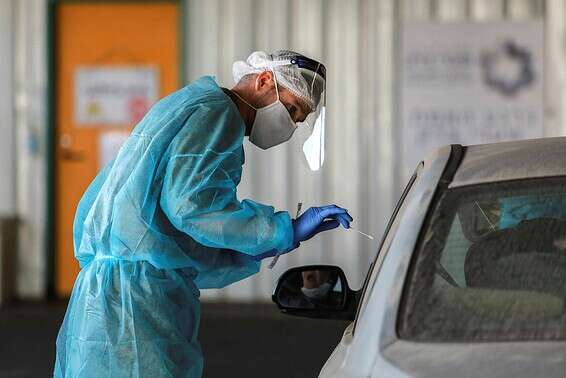Reports of mutations in the virus may impair the effectiveness of potential vaccines • The process of producing vaccines has become more complex than before, requiring rethinking
A volunteer gets vaccinated against the corona virus in Mexico, on Friday
Photography:
Reuters
The corona crisis serves as a mirror that presents before our eyes the structural problems of the various systems in Israel and around the world.
The crisis is one of many, and probably not the biggest, that we will have to deal with in the future.
Global climate change is leading to a variety of phenomena, from natural disasters to climate refugees and the undermining of regimes.
The conditions for the corona outbreak, as well as other disease outbreaks in recent decades, are deeply linked to the profound ecological changes taking place around the world, and the health challenge is not the only one we will face, even in the future.
On the other hand, the health systems in Israel and around the world also entered the corona crisis when they suffered from a chronic and ongoing crisis.
This situation is the result of years of lack of investment in infrastructure and manpower in public systems, as well as the continuing rise in prices of medical technologies and the pharmaceutical industry, which produce less innovation and more profits for shareholders.
I'm tying things together - advances in vaccine development, including Pfizer's announcement of higher-than-expected efficacy of the vaccine it developed, and on the other hand reports of mutations in the virus, highlighting reports that Denmark has killed about 16 million mines growing in 1,100 farms to stop mutation spread. Corona virus, which has been found to infect humans as well.
Seemingly the immediate connection between the news of advances in vaccine development and mutations in miners is the fear that the mutation will impair the effectiveness of potential vaccines, but in my view the connection is much deeper and touches on questions of economics, priorities and sustainability.
The news about the various vaccines, which are advancing in the various stages of clinical trials, is excellent news.
Never in human history have vaccines been developed so rapidly.
But to me this is a narrow point of view: the World Health Organization and various international bodies have in fact failed to develop an immunization program that looks at a global perspective, collaborating that could have compared the different vaccines more effectively, saving time and resources and enabling mass production worldwide. .
This is one of the important functions of the organization - to organize operations to stop outbreaks of epidemics.
After all, the World Health Organization has led the successful global effort to eradicate smallpox, and is now leading the effort to eradicate polio.
Instead, the vaccine development process has become a competition in the bad sense, in a way that it is not certain that various countries, including Israel, will get it soon.
The Rand Institute estimates that this lack of cooperation will result in many countries receiving the vaccine very late, and will have a huge international cost of more than a trillion dollars in losses.
Until a few decades ago many countries had institutes of vaccine production for emergencies, whereas today the process is extremely complex and requires rethinking the whole process in a way that will be more sustainable.
In the same way, the extermination of miners in Denmark requires us to rethink sustainability and the relationship between animals and humans.
The mass and painful extermination of the minks marks the problematic nature of the fur industry.
Similar to the spread of bird flu, when animals are kept in overcrowding and filth, it is a breeding ground for epidemics.
In fact, the corona also came to us because of contact between animals and humans.
If we do not profoundly change the food industry and the relationship between us and animals, the development of various mutations that will lead to disease is only a matter of time.
The corona is a mirror for us to the existing structural and economic aspects.
These are just two examples and many more can be brought up.
Will we bring about change?
It will not happen by itself, it is only in our hands.
The author is the head of the School of Public Health, Ben-Gurion University of the Negev

